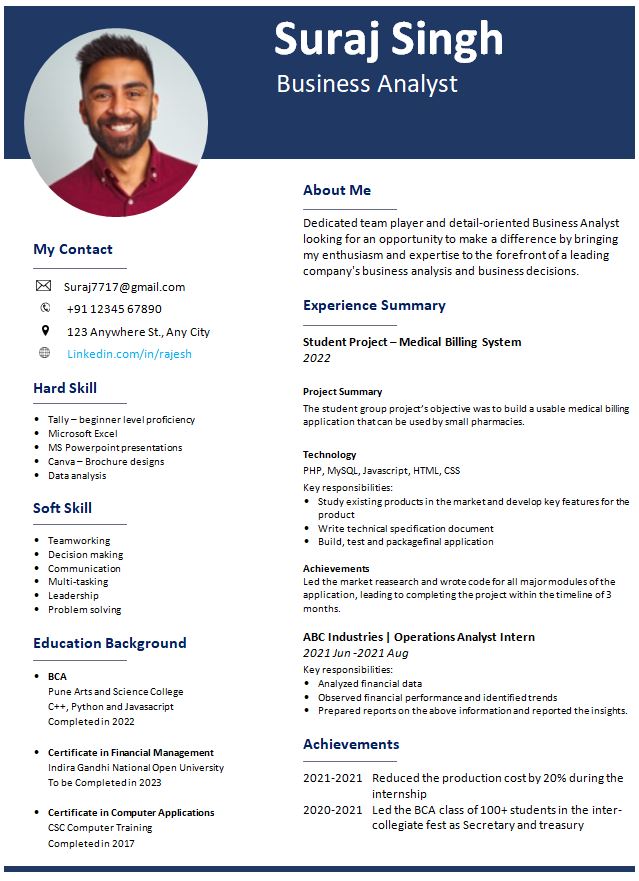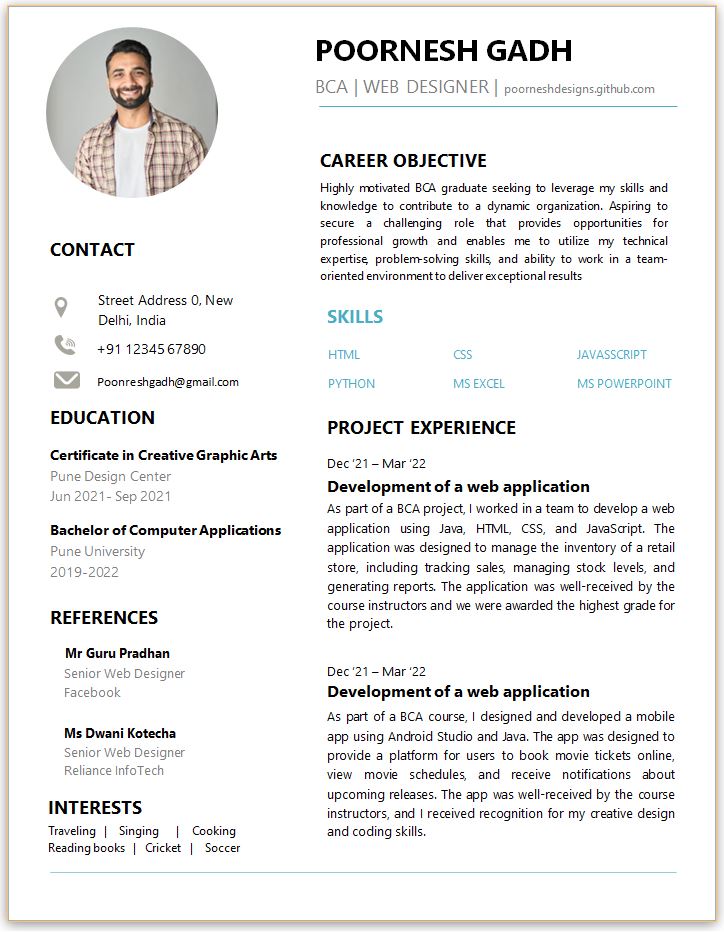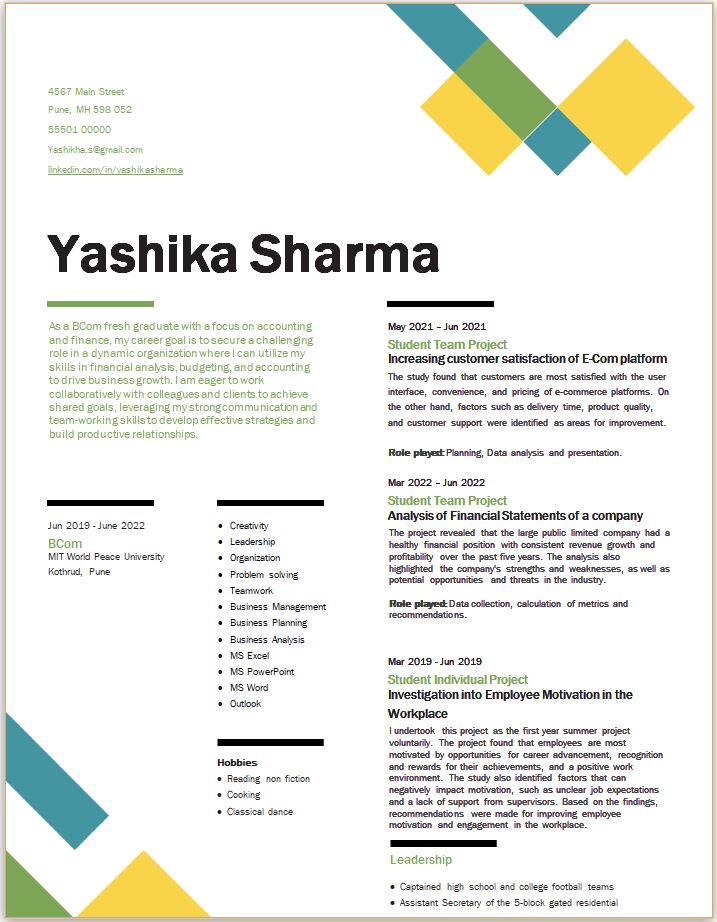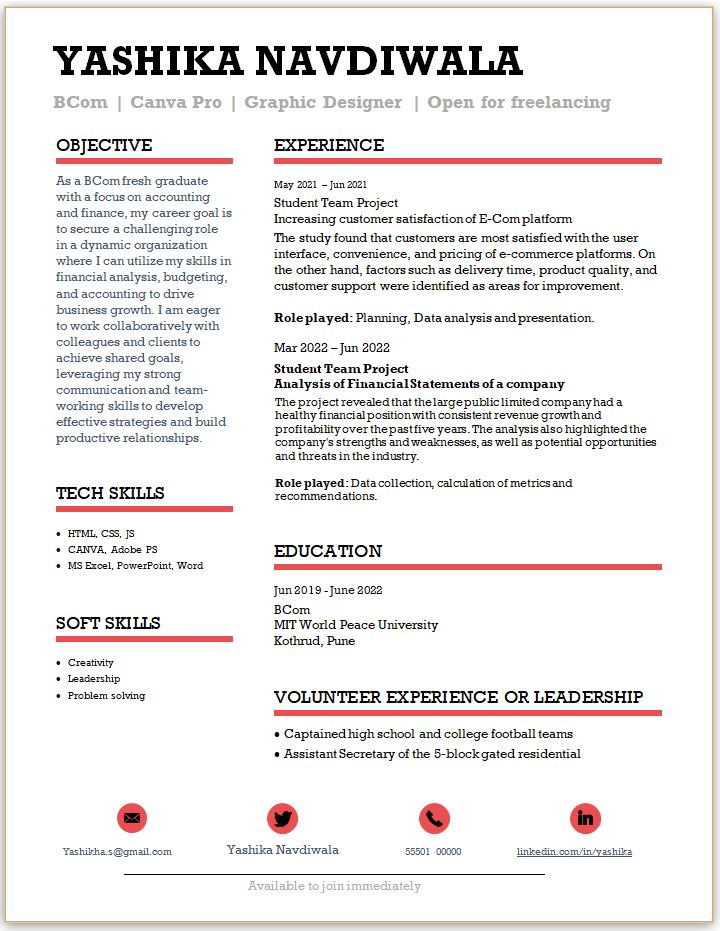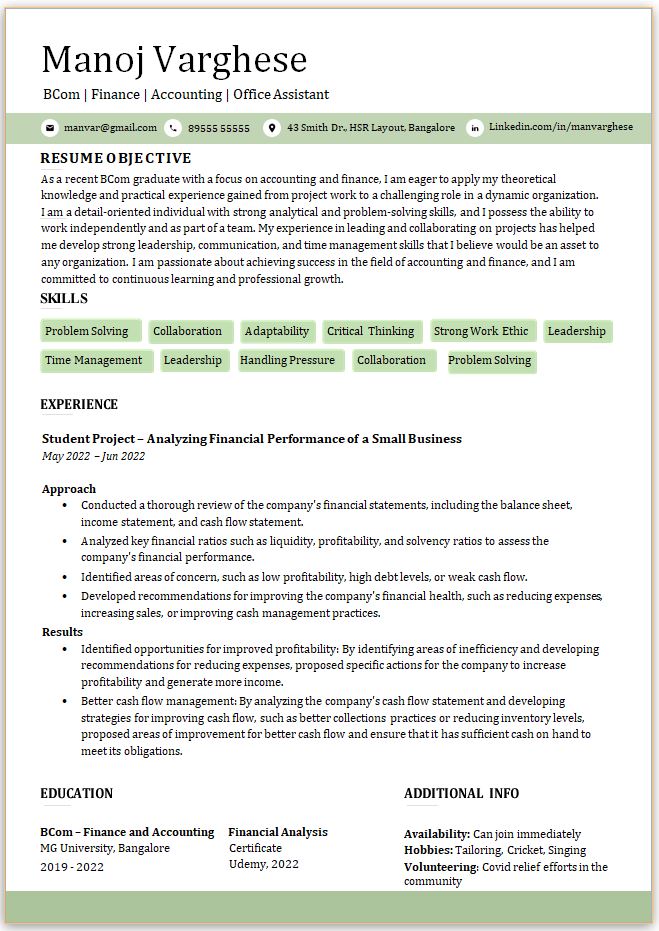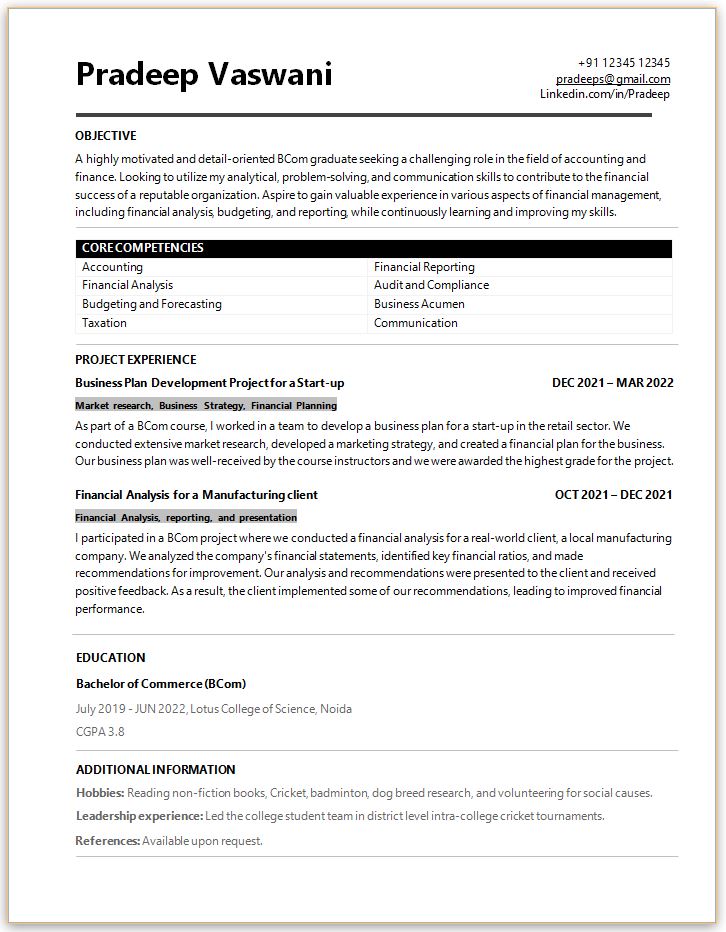50 Hobbies & interests in resume for freshers

08 May 2023

Why Should You Mention Hobbies and Interests on Your Resume
One surprising fact about including hobbies and interests in a resume is that it can actually increase your chances of being hired. While traditionally resumes have focused solely on professional experience and qualifications, more and more employers are looking for well-rounded candidates who bring unique skills and perspectives to the workplace. Including hobbies and interests on your resume can help you stand out and showcase your personality, passions, and skills outside of work.
Additionally, hobbies and interests can provide valuable insight into your character and work ethic. For example, if you list that you enjoy playing team sports, this may indicate that you are a collaborative and team-oriented person. Similarly, if you list that you enjoy hiking and exploring the outdoors, this may suggest that you are resilient and able to push through challenges. Including hobbies and interests on your resume can also provide a great conversation starter during an interview. If you have a shared hobby or interest with your interviewer, it can help establish a connection and make you more memorable. This can be especially helpful in competitive job markets where many candidates have similar qualifications.
In addition, hobbies and interests can demonstrate skills that are valuable in the workplace. For example, if you list that you enjoy playing chess, this may suggest that you have strong strategic thinking skills. If you mention that you enjoy playing music or participating in theater, this may indicate that you have strong public speaking and performance abilities. These types of skills are often highly valued by employers and can give you an edge over other candidates.
However, it's important to be strategic about the hobbies and interests you include on your resume. Make sure they are relevant to the position you are applying for and highlight skills or traits that are important for the role. For example, if you are applying for a sales position, you may want to highlight hobbies that demonstrate your communication and interpersonal skills.
Lastly, keep in mind that including hobbies and interests on your resume is optional and not necessary for all positions. If you are applying for a job that is strictly professional, such as a lawyer or accountant, it may be more appropriate to focus solely on your professional experience and qualifications.
We will cover the following in this post aimed at helping fresh graduates
- Why should you mention Hobbies and Interests on Your Resume
- 10 best Hobbies and Interests to lisst on Your Resume
- How to include Hobbies and Intests on Your Resume
- 5 Things to be careful about in listing Hobbies and Interests on Your Resume
- 50 Best Hobbies and Interests to Include in Your Resume
Why should you mention Hobbies and Interests on Your Resume?
One may be wondering whether it really matters if someone is a fresh graduate or an experienced professional when it comes to deciding on including hobbies and interests in the resumes.
When it comes to including hobbies and interests on a resume, there are some considerations that may differ depending on whether you are an experienced professional or a recent graduate:
For experienced professionals:- Focus on hobbies and interests that are relevant to the position or industry you are applying for, and that can highlight your skills or experience. For example, if you are applying for a marketing position, you may want to mention your experience with social media or your interest in consumer behavior
- Consider how your hobbies and interests can showcase your personality or values, and how that can align with the company culture or values of the organization you are applying to.
- Keep it concise and relevant. If you have a lot of professional experience, your resume should focus more on that than on your hobbies and interests.
- Including hobbies and interests can be a good way to fill out your resume if you have little professional experience, but make sure to prioritize your education and any relevant coursework or internships.
- Consider how your hobbies and interests can demonstrate transferable skills that can be valuable in the workplace, such as leadership, teamwork, or communication skills.
- Be mindful of how your hobbies and interests can reflect on your character or professionalism. Avoid including anything that could be controversial or polarizing.
Expert resume tip!
If you are in doubt whether to include a particular hobby or interest on your resume, better don't include; especially, if you do not have a lot of space on your resume.
But, if you are fresh graduate and you have a lot of space on your resume, and you also have some hobbies and interests that are relevant to the job you are applying to, by all means include the hobbies and resume.
Are Hobbies and Interests the same or are they different?
Hobbies and Interests are different. These two are similar but they are not the same.
Hobbies are activities that you engage in for pleasure or recreation in your free time.They can include things like playing sports, reading, painting, or playing an instrument. Hobbies can provide insight into your personality, interests, and values, and can help showcase your skills and abilities. They can also be a way to show that you are well-rounded and have interests outside of work.
Interests, on the other hand, are broader than hobbies and refer to anything that you find engaging or fascinating.Interests can include things like current events, technology, sustainability, or entrepreneurship. While hobbies are typically activities you engage in actively, interests can be more passive and simply refer to things you enjoy learning about or following.
On a resume, hobbies and interests can be included together in a section or listed separately, depending on the preferences of the job seeker. However, it's important to keep in mind that both hobbies and interests should be relevant to the job you are applying for and should highlight skills or traits that make you a strong candidate.
Also, being smart about including hobbies and interests on your resume can help you stand out from the crowd if all other applicants have nearly similar or same qualifications as you - for example in the case of campus interviews. For example, if the job requires hosting events in a shopping mall, announcing new product launches and you mention that managing events in your local neighborhood as a hobby on your resume, you stand a better chance than someon who could have mentioned playing board games as her hobby.
Similarly, if the job you are applying to involes a lot of competitor analysis in the video games market and you mention in your resume that following the video games market trend is an area of interest, you might appear to the recruiter as a more relevan candidate.
In general, hobbies tend to be more specific and focused on particular activities, while interests are broader and can encompass a wider range of topics. However, the distinction between the two can be somewhat subjective and may vary depending on the individual.
Resume examples that show Hobbies and Interests
When do you include Hobbies and Resumes on Your Resume
Including hobbies and interests on a fresh graduate's resume can be a great way to showcase your personality, demonstrate your skills and interests, and make you stand out from other applicants. Here are some guidelines on when to include hobbies and interests on your resume as a fresh graduate:
If you have little professional experience:If you have limited work experience, including hobbies and interests can help fill out your resume and show that you have other skills and interests that may be relevant to the job.
If your hobbies and interests align with the job or industry you are applying for:If your hobbies and interests are related to the job or industry you are applying for, they can help demonstrate your passion and dedication to the field.
If your hobbies and interests showcase transferable skills:If your hobbies and interests demonstrate skills that can be valuable in the workplace, such as leadership, teamwork, or communication skills, it can be worth including them on your resume.
If your hobbies and interests can help you stand out:If your hobbies and interests are unique or impressive, they can help you stand out from other applicants and make a memorable impression on the employer.
If you have limited space on your resume:If you have limited space on your resume and need to choose between including hobbies and interests or other sections such as a summary or skills section, you may want to prioritize the other sections first. However, if you have space and feel that including hobbies and interests can add value to your application, it can be a good addition.
In summary, when deciding whether to include hobbies and interests on your fresh graduate resume, consider whether they are relevant, showcase your skills and personality, and can help you stand out in a positive way. Remember to keep it concise and only include hobbies and interests that add value to your application.
Best Hobbies and Interests to Put on Your Resume
In summary, your hobbies and interests should be relevant to the job you are appling to. It is also one of the reasons why you should not use the same resume to all jobs you are applying you. Tailoring the resume to the job you are applying to is one of the most fundamental skilsl you will aquire as you become better at navigating the job market throughout your career. Not revising the resume for the job one is applying to is a mistake similar to that of grammatical and typo errors on resumes.
We have a lot of resume templates based on the degree you have and the kind of job you want. Check on these resumes to see how we have listed hobbies and interests that are relevant to the job the career objective statements have been writting for.
Below, you will see a list of examples for each of the most popular hobbies that we see candidates pursue and are worth including on your resumes. Feel free to modify and use on your resumes accordingly.
#1. Reading
Mentioning reading as a hobby can showcase your intellectual curiosity and willingness to learn, which can be valuable in many industries.
Mentioning reading as a hobby on your resume can demonstrate your intellectual curiosity and your willingness to learn. This can be a valuable trait in many industries, as employers often look for candidates who are eager to expand their knowledge and skills.
This hobby can be relevant to any job that requires a high level of knowledge or intellectual curiosity, such as research, writing, or teaching.
Reading Hobby Examples- Student Newspapers: Published articles in online publications or student newspapers to demonstrate strong communication skills and a passion for writing
- Writing Competitions: Participated in writing contests or workshops to develop writing skills and techniques
- Personal Blog: Created a personal blog or website to showcase writing samples and demonstrate a consistent writing practice
- Book Club Participation: Actively participate in a book club, discussing literary works, analyzing themes, and sharing insights with fellow readers.
- Book Club Participation: Demonstrate engagement in intellectual discussions and the ability to analyze and interpret literature.
- Literary Blogging or Book Reviews: Maintain a personal blog or contribute to online platforms where you share book reviews, literary analysis, or recommendations.
- Literary Blogging or Book Reviews: Showcase your ability to critically evaluate and articulate thoughts on various genres and authors.
- Literary Event Attendance: Attend author readings, book launches, or literary festivals to stay updated with the latest trends and gain exposure to diverse literary voices.
- Literary Event Attendance: Demonstrate a genuine interest in the literary community and a commitment to expanding knowledge in the field.
- Reading Challenges: Participate in reading challenges or set personal reading goals to broaden your literary horizons and explore different genres or authors.
- Reading Challenges: Highlight your dedication to continuous learning and your ability to manage and accomplish personal objectives.
- Literary Volunteering: Volunteer at libraries, literary organizations, or literary festivals, assisting with event coordination, book drives, or children's reading programs.
- Literary Volunteering: Showcase your commitment to promoting literacy, fostering community engagement, and supporting literary initiatives.
- Literary Podcasting or YouTube Channel: Host a literary podcast or YouTube channel where you discuss books, interview authors, or provide literary analysis and recommendations.
- Literary Podcasting or YouTube Channel: Demonstrate your communication skills, creativity, and ability to engage and entertain an audience through literary content.
- Reading Comprehension and Analysis: Develop strong reading comprehension and analytical skills by actively engaging with challenging literary works, classics, or academic publications.
- Reading Comprehension and Analysis: Highlight your ability to extract meaning, identify literary devices, and provide thoughtful analysis of complex texts.
#2. Blogging or Writing
This hobby can be relevant to any job that requires strong communication skills, such as marketing, public relations, or content creation.
If you have a passion for writing, it can demonstrate your communication skills and attention to detail, which are highly valued in many jobs.
From the recruiter's point of view, if you have a passion for writing, it can demonstrate your communication skills, attention to detail, and ability to convey ideas clearly and concisely. These are all highly valued skills in many jobs, such as marketing, public relations, or content creation.
Writing Hobby Examples- Regularly attend book clubs to discuss literature and engage in critical thinking and analysis
- Maintain a personal library and read a variety of genres to broaden knowledge and understanding
- Created a blog or social media account to share reviews and recommendations to engage with other readers
#3. Traveling
If you have traveled extensively, it can showcase your adaptability, curiosity, and cultural awareness, which can be valuable in many industries such as tourism, hospitality, and international business.
If you have traveled extensively, it can showcase your adaptability, cultural awareness, and interpersonal skills. These are all highly valuable skills in today's global economy, particularly in industries such as tourism, hospitality, or international business.
This hobby can be relevant to jobs in the tourism or hospitality industry, as well as any job that involves international business or cultural awareness, such as diplomacy or trade.
Traveling Hobby Examples- Studied abroad or participated in cultural exchange programs to demonstrate a global perspective and cross-cultural communication skill
- Planned and executed trips independently to demonstrate strong organizational skills and attention to detail
- Created travel guides or blog posts to demonstrate strong communication and writing skills and a passion for travel
#4. Sports
If you play sports or participate in physical activities, it can showcase your teamwork, leadership, and discipline, which can be valuable in many industries.
Sports Hobby Examples- Volunteered as a coach or referee to demonstrate a commitment to the sport and strong interpersonal skills
- Participated in sports tournaments or competitions to demonstrate dedication and competitiveness
- Volunteered as a coach or referee to demonstrate a commitment to the sport and strong interpersonal skills
If you play sports or participate in physical activities, it can showcase your teamwork, leadership, and discipline. These are all valuable skills in many industries, particularly those that require collaboration, such as sales, marketing, or project management.
#5. Volunteer work
If you have volunteered for a social cause or community service, it can demonstrate your commitment to making a positive impact and your ability to work in a team.
By listing volunteer work as a hobby on a resume, it showcases the candidate's dedication to making a positive impact in their community, and demonstrates their ability to work in a team. This can be relevant to many jobs that involve social responsibility, such as non-profit or government work. Additionally, volunteering can demonstrate a willingness to take on new challenges and can help develop skills such as leadership, communication, and problem-solving.
Volunteer Work Hobby Examples- Animal Care: Volunteer at local animal shelter, walking and caring for dogs on weekends
- Food Bank: Volunteer at local food bank, sorting and distributing food to those in need once a month
- Community: Volunteer at local Community Primary Health Center - helping medical professionals administer Covid-19 vaccines
- Mentoring or Tutoring: Volunteered as a mentor or tutor, providing guidance and academic support to students in subjects like math, science, or language arts.
- Mentoring or Tutoring: Assisted individuals in improving their skills and knowledge, fostering personal and educational development.
- Environmental Conservation: Participated in environmental clean-up initiatives, such as beach clean-ups, tree planting events, or community garden maintenance.
- Environmental Conservation: Raised awareness about environmental issues and promoted sustainable practices within the community.
- Youth or Sports Coaching: Volunteered as a youth sports coach, teaching fundamental skills, promoting teamwork, and fostering personal growth in young athletes.
- Youth or Sports Coaching: Organized and led practice sessions, supervised games, and served as a positive role model for youth participants.
- Community Event Organization: Contributed to the planning and execution of community events, such as festivals, fundraisers, or charity runs.
- Community Event Organization: Assisted with logistics, volunteer coordination, marketing, or event setup, ensuring successful and impactful community gatherings.
- Elderly Care or Companionship: Volunteered at nursing homes or assisted living facilities, providing companionship, organizing activities, or assisting with daily tasks for elderly residents.
- Elderly Care or Companionship: Demonstrated empathy, patience, and a commitment to improving the quality of life for senior community members.
- Crisis Hotline or Helpline Support: Volunteered as a crisis hotline responder, offering emotional support, active listening, and resources to individuals in distress./li>
- Crisis Hotline or Helpline Support: Received specialized training to handle sensitive situations and maintained confidentiality while providing empathetic assistance.
- Social Advocacy: Engaged in volunteer work for a social cause or advocacy organization, raising awareness, organizing campaigns, or participating in community outreach.
- Social Advocacy: Contributed to initiatives related to human rights, gender equality, racial justice, or other social issues that align with personal values.
#6. Music
If you play a musical instrument or have an interest in music, it can showcase your creativity, dedication, and attention to detail. These are all valuable skills in many jobs, particularly those that require innovation or artistic talent, such as design or advertising
If you play a musical instrument or have an interest in music, it can showcase your creativity, dedication, and attention to detail.
This hobby can be relevant to any job that involves creativity or artistic talent, such as design or advertising.
Music Hobby Examples- Played Guitar in a band or orchestra to demonstrate teamwork and collaboration skills
- Composed or arranged music to demonstrate creativity and artistic talent
- Performed at local venues or events to demonstrate dedication and confidence in front of an audience
#7. Photography
If you have an interest in photography, it can showcase your creativity, attention to detail, and ability to capture and convey ideas visually. These are all valuable skills in many jobs, particularly those that require visual communication or design, such as advertising, social media, or branding.
Photography can showcase your creativity, attention to detail, and ability to capture and convey ideas visually.
This hobby can be relevant to any job that involves visual communication or design, such as advertising, social media, or branding.
Photogrpahy Hobby Examples- Participated in photography classes or workshops to develop technical and artistic skills
- Contributed photographs to online or print publications to demonstrate a passion for photography and a strong visual eye
- Volunteered as a photographer for events or organizations to demonstrate a willingness to use skills for the benefit of others
#8. Cooking
This hobby can be relevant to any job that involves attention to detail or precision, such as research or data analysis, as well as any job in the food and beverage industry.
If you enjoy cooking or trying new recipes, it can showcase your creativity, attention to detail, and ability to follow instructions. These are all valuable skills in many jobs, particularly those that involve attention to detail or precision, such as research or data analysis.
If you enjoy cooking or trying new recipes, it can showcase your creativity, attention to detail, and ability to follow instructions, which can be valuable in many industries such as hospitality or food and beverage.
Cooking Hobby Examples- Participated in cooking classes or workshops to develop culinary skills and techniques
- Created original recipes or modified existing ones to demonstrate creativity and attention to detail
- Maintained a food blog or social media account to showcase cooking skills and share recipes with a wider audience
#9. Technology
If you have an interest in technology or enjoy coding, it can demonstrate your analytical and problem-solving skills, which are highly valued in many industries.
If you have an interest in technology or enjoy coding, it can demonstrate your analytical and problem-solving skills. These are highly valued skills in many industries, particularly those that involve technical expertise or innovation, such as engineering or software development.
This hobby can be relevant to any job that involves technical expertise or innovation, such as engineering, software development, or data science.
Technology Hobby Examples- Certifications: Completed online courses or certifications in coding or programming languages to demonstrate technical expertise
- Open source contributions: Developed or contributed to open-source software or applications to demonstrate collaboration and innovation skills
- Hackathons: Participated in hackathons or coding competitions to demonstrate problem-solving and critical thinking skills
- Electronics Projects: Developed projects using Arduino and Raspberry Pi, demonstrating a practical understanding of microcontrollers and hardware integration.
- Electronics Projects: Designed and built various electronic circuits and DIY devices, showcasing proficiency in soldering, circuitry, and troubleshooting.
- Mobile App Development: Created mobile applications as a hobby using languages such as Java and Swift, highlighting proficiency in app development and UI/UX design.
- Mobile App Development: Published personal apps on app stores, demonstrating initiative, creativity, and a strong understanding of mobile development frameworks.
- Web Development: Built and maintained responsive websites and web applications using HTML, CSS, and JavaScript, showcasing front-end development skills and attention to detail. (Link)
- Web Development: Developed web projects utilizing frameworks like React or Angular, displaying proficiency in modern web development technologies.
- Data Analysis or Data Visualization: Explored data analysis and visualization using Python and tools like Pandas, Matplotlib, or Tableau, showcasing a data-driven mindset and analytical skills.
- Data Analysis or Data Visualization: Created visualizations to effectively communicate insights from datasets, demonstrating the ability to present complex information in a visually appealing manner.
- Internet of Things (IoT): Developed IoT projects, connecting devices to the internet and leveraging platforms like Arduino or Raspberry Pi to create smart and interconnected systems.
- Internet of Things (IoT): Implemented IoT solutions to solve real-world problems, showcasing a strong understanding of IoT technologies and protocols.
- Cybersecurity: Pursued online courses and certifications in cybersecurity, deepening knowledge in areas like ethical hacking, network security, or secure coding practices.
- Cybersecurity: Participated in Capture the Flag (CTF) challenges, demonstrating practical skills in identifying vulnerabilities and implementing security measures.
- Virtual Reality (VR) or Augmented Reality (AR): Explored VR or AR technologies and created immersive experiences using tools like Unity or Unreal Engine, showcasing proficiency in 3D modeling, programming, and user interaction design.
- Virtual Reality (VR) or Augmented Reality (AR): Developed VR/AR applications or prototypes, demonstrating creativity, problem-solving abilities, and a passion for cutting-edge technologies.
#10. Art
This hobby can be relevant to any job that involves design or visual communication, such as advertising, branding, or graphic design.
If you have an interest in art or enjoy painting or drawing, it can showcase your creativity, attention to detail, and ability to communicate ideas visually. These are all valuable skills in many jobs, particularly those that involve design or visual communication, such as advertising or branding.
Art Hobby Examples- Art Classes: Participated in art classes or workshops to develop skills in various mediums such as painting, drawing, or sculpture
- Art Exhibitions: Participated in art exhibitions or shows to demonstrate artistic talent and creative expression
- Artwork Contributions: Contributed artwork to online or print publications to showcase artistic skills and experience
- Painting or Drawing: Practiced various painting techniques, such as watercolor, acrylic, or oil painting.
- Painting or Drawing: Created detailed drawings using different mediums, such as graphite, charcoal, or pastels.
- Photography: Captured compelling images using different photography techniques and equipment.
- Photography: Demonstrated proficiency in editing and post-processing photos using software like Adobe Photoshop or Lightroom.
- Graphic Design: Designed visually appealing graphics for digital or print media, showcasing skills in layout, typography, and color theory.
- Graphic Design: Utilized design software like Adobe Illustrator or Photoshop to create logos, posters, or social media graphics.
- Digital Art: Created digital illustrations or artwork using digital drawing tablets and software like Procreate or Adobe Creative Suite.
- Digital Art: Explored different digital art styles, showcasing creativity and versatility in digital mediums.
- Sculpture or Pottery: Sculpted three-dimensional art pieces using clay, wood, metal, or other materials.
- Sculpture or Pottery: Developed pottery skills, including wheel throwing, hand-building techniques, and glazing.
- Printmaking: Practiced printmaking techniques such as linocut, screen printing, or etching.
- Printmaking: Created unique and visually appealing prints using various tools and methods.
- Mixed Media Art: Explored the combination of different art forms and mediums, such as combining painting, collage, and digital elements.
- Mixed Media Art: Created mixed media artworks that convey personal style and experimentation.
Important Soft and Hard Skills Related to Hobbies and Interests On a Resume
The very purpose of including hobbies and interests in the resume is to stand out to the recrutirer and hiring managers as they see you have commonalities with the job in addition to skills and experiences. But, the hiring managers and recruiters tend to connect the hobbies and interests to the soft skills and technical skills relevant to the job; this is just like how the recruiters would interpret spelling and grammatical mistakes on the resume as being careless, inattentive and lack of ablity to plan and prioritize, etc.
Mapping of soft and hard skills to hobbies and interests
So what do the recruiters precisely get from paying attention to the hobbies and interests on your resume? As the recriters unsonsciously map the hobbies and interests on your resume to soft and hard skills, the gain several insights about a candidate:
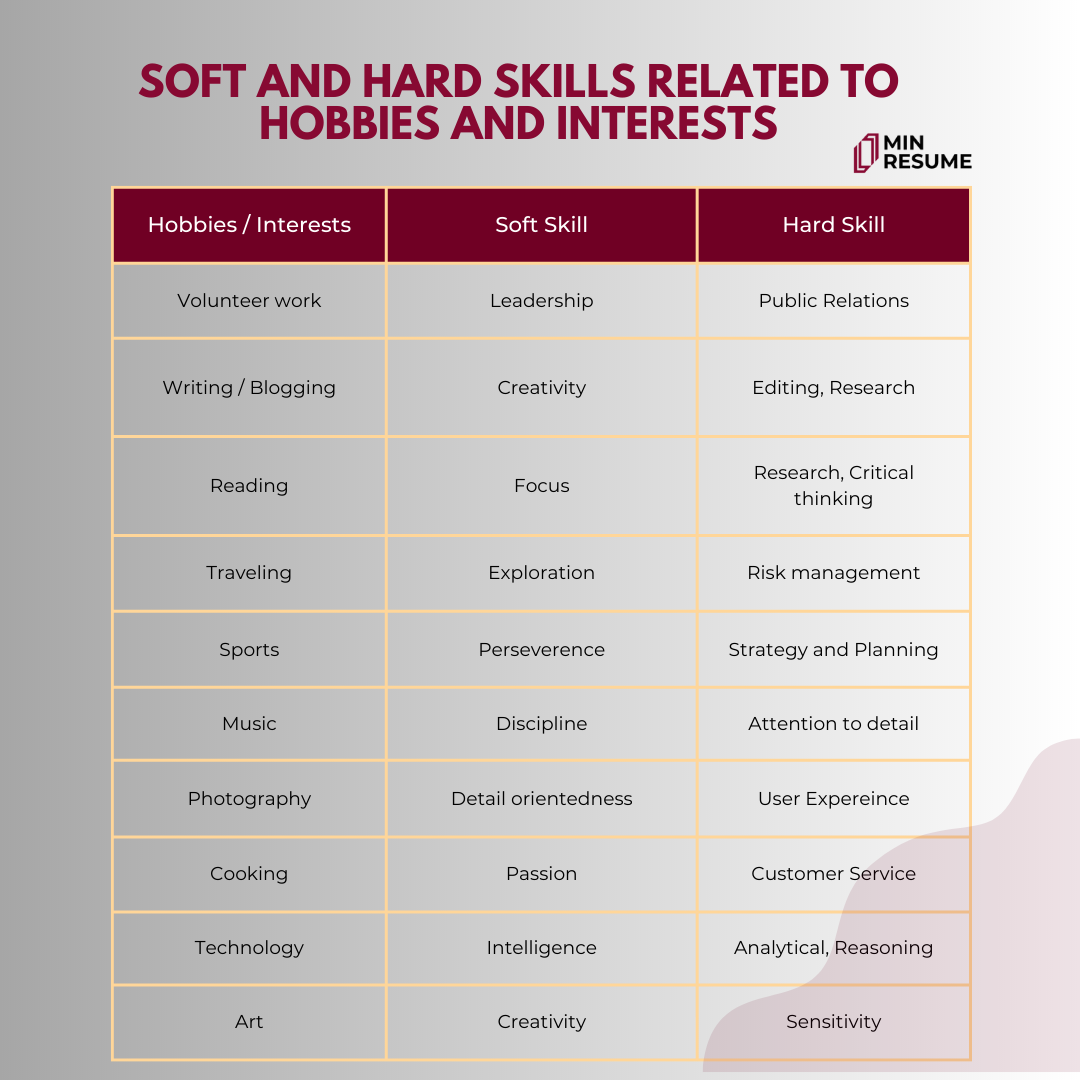
Transferable skills: Hobbies and interests can reveal the skills a candidate has developed that may transfer to their professional life. For example, if a candidate lists writing as a hobby, it suggests they may have strong written communication skills that could be applied to their job.
Passion and dedication: Hobbies and interests can also demonstrate a candidate's passion and dedication to a particular activity. This may indicate that the candidate is highly motivated and committed, which can be attractive qualities for an employer.
Cultural fit: The hobbies and interests section can also provide insights into a candidate's personality and values, which can help employers assess whether the candidate is a good fit for the company culture.
Uniqueness: Listing unique hobbies and interests can help a candidate stand out from other applicants and leave a memorable impression on potential employers.
Overall, mapping hard and soft skills to hobbies and interests on a resume can help you provide a more holistic view of your abilities and personality, which can be valuable information for employers when making hiring decisions, so do not be casual about including hobbies and interests on your resume, but be strategic.
Frequently Asked Questions about Hobbies and Interests
1. Should hobbies and interests be on a resume?
Short answer is Yes, if you have space on your resume and No if you are doubtful. If you have the tiem to deliberate on whether to include hobbies and interests on your resume, then read on for some insights.
Including hobbies and interests on a resume is a personal choice and depends on several factors, such as the type of job, industry, and the individual's background and experience.
In some cases, listing relevant hobbies and interests on a resume can be a great way to demonstrate skills, interests, and personality traits that are not captured in the other sections of the resume. For example, if a candidate is applying for a job that requires creativity, including hobbies such as painting or photography may showcase their creative abilities and passion for the field.
However, in other cases, it may not be necessary or appropriate to include hobbies and interests on a resume, especially if they are not relevant to the job or industry. Additionally, including hobbies and interests that may be controversial or divisive (such as political or religious affiliations) can also be risky and potentially impact the hiring decision.
Ultimately, the decision to include hobbies and interests on a resume should be based on the specific job, industry, and the individual's judgment about what will make them stand out as a candidate.
Finally, why do we recommend that you do not include hobbies and interests on your resume if you are hestant or doubtful about including them? The point is you get hired for your core technical skills and soft skills that are essential to being succesful at the job. While it is possible tht recruiting mangers won't even notice that you have not included hobbies and intersts in your resume, a poorly chosen hobby and interest on your resume will stand out and cause unnecessary doubts in the minds of the rerecruiting manager. So, if you are in doubt about including a particular hobby and interest on your resume for a specific job, we recommend you leave out the section and rather use that space to highlight a project or a work experience that more directly fits the responsibilities the job you are applying to has.
2. What are some good example hobbies and interests to put on my resume?
We also have a few other resources on the topic of hobbies and interests on resume, especially on fresher resumes. Check them out as well here.
Sports, art, blogging, writing, reading and volunteer work are all some most commonly used as they fit nearly all jobs one can apply to. So, if you have either an interest or these are your hobbies, go ahead and add them to the resume.
In general, the hobbies and interests you should put on your resume will depend on the specific job you are applying for and your personal background and experience. However, here are some examples of hobbies and interests that may be relevant to various job types:
Creative jobs: If you're applying for a creative job, such as graphic design, writing, or photography, including hobbies such as painting, drawing, creative writing, or photography can demonstrate your artistic abilities and passion for the field.
Sports-related jobs: If you're applying for a job in the sports industry, including hobbies such as playing a sport, coaching a team, or participating in fitness activities can showcase your interest in the field and your dedication to maintaining a healthy and active lifestyle.
Volunteer work: Including volunteer work in your hobbies and interests section can demonstrate your commitment to social causes and your ability to work collaboratively with others.
Travel: If you're applying for a job that involves international travel or cultural immersion, including hobbies such as traveling, learning languages, or experiencing new cultures can showcase your curiosity and adaptability.
Leadership: Including hobbies such as leading a club, organizing events, or participating in public speaking can demonstrate your leadership skills and ability to work with others.
Remember to tailor your hobbies and interests to the specific job you are applying for and highlight those that align with the skills and values sought by the employer. Additionally, only include hobbies and interests that are appropriate and professional and avoid any controversial or divisive topics.
3. What are some hobbies and interests for a student resume?
For a student resume, it's essential to highlight extracurricular activities, hobbies, and interests that demonstrate skills that employers seek in entry-level candidates. Here are some examples:
Volunteering: Including volunteer work in your hobbies and interests section can demonstrate your commitment to social causes and your ability to work collaboratively with others.
Leadership: Participating in clubs and organizations or organizing events can demonstrate your leadership skills and ability to work with others.
Athletics: If you participate in sports or fitness activities, it can demonstrate your ability to work collaboratively with a team and your dedication to maintaining a healthy and active lifestyle.
Creative hobbies: If you have a passion for creative pursuits, such as writing, painting, or photography, it can demonstrate your artistic abilities and attention to detail./p>
Language learning: If you're proficient in multiple languages or are learning a new language, it can demonstrate your adaptability, cultural awareness, and communication skills.
Academic achievements: Including academic achievements such as awards, scholarships, and honors can demonstrate your dedication to learning and your ability to achieve goals.
Mistakes to avoid in listing Hobbies and Interests on your Resume
When adding Hobbies and Interests on your resume, the single most mistake to avoid is including a hobby or interest that is not a good fit for the job at all, and in some cases even oppostie in spirit to what the job requires. We will illustrate these common mistakes through some examples.
1. Watching TV or movies:This hobby doesn't demonstrate any relevant skills or interests related to the job you're applying for and can come across as lazy or unproductive.
2. Drinking or partying:Including hobbies related to excessive drinking or partying can be perceived negatively and may harm your chances of getting hired.
3. Political activism:Including controversial or divisive political interests or affiliations on your resume can be risky as it may lead to bias and potentially impact the hiring decision.
4. Gaming:Including excessive gaming interests can be perceived as unproductive and may lead the employer to question your time-management skills.
5. Inappropriate or offensive activities:Including hobbies or interests that may be inappropriate or offensive, such as illegal activities or hate groups, can result in the employer disqualifying you as a candidate and negatively impact your reputation.
Examples of hobby or interest that might be good but not a perfect fit for the job
While there are several interesting hobbies one might pursue to satiate their creative thirsts, one needs to be careful before including them on the resume. The hobby itself may not have prompt questions in the reviewer's head, it is how well the hobby you are listing fits the job profile you are applying to. There are numerous examples we have seen in the real world where hobbies were listed that not only did not fit the job profile but also were somehow helping cause erosion of fitment value that was created by technical credentials of the candidate. We will explain a few cases below.
1. Extreme sports:If you're applying for a desk job or a job that doesn't require physical activity, listing extreme sports like skydiving, rock climbing, or bungee jumping as your hobby or interest might seem like an odd fit. It may even suggest that you have a high-risk appetite, which may not align with the job requirements.
2. Video games:If you're applying for a job that requires a lot of social interaction or communication, listing video games as your hobby or interest may suggest that you prefer isolation and may not be a team player. While gaming can demonstrate problem-solving skills, too much emphasis on it may not be a good fit for certain jobs.
3. Hunting or Shooting:If you're applying for a job in a corporate environment, listing hunting or shooting as your hobby or interest may suggest that you're not comfortable with the office culture, and it may be perceived negatively by the employer.
4. Gambling:If you're applying for a job that requires financial responsibility, listing gambling as your hobby or interest may raise red flags about your judgment and ability to manage money effectively. It may also suggest that you have an addiction or impulse control issues.
5. Political activism:If you're applying for a job that requires impartiality, listing political activism as your hobby or interest may suggest that you have strong political views that may not align with the company's values. It may also create the impression that you may not be able to put aside your personal beliefs and remain neutral in a professional capacity.
6. Competitive eating:If you're applying for a job that requires health and fitness, listing competitive eating as your hobby or interest may suggest that you don't prioritize your health and may not be a good fit for the job requirements.
7. Meditation or Yoga:If you're applying for a job that requires a lot of energy, extroversion, and enthusiasm, listing meditation or yoga as your hobby or interest may suggest that you're too laid back and may not fit in with the team culture. While these hobbies demonstrate mindfulness and relaxation, they may not be suitable for all types of jobs.
